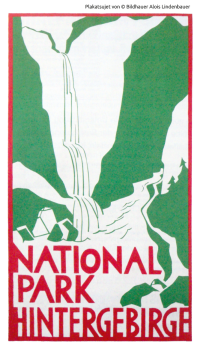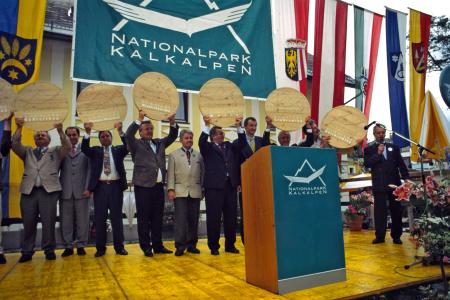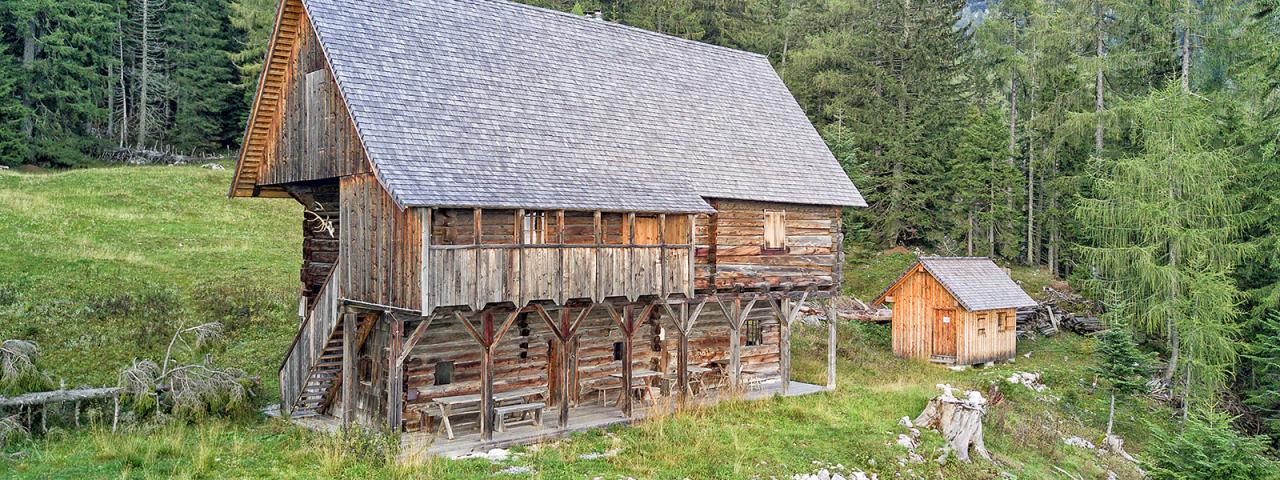Kalkalpen National Park
Chronicle
1976
Establishment of the Sengsengebirge nature reserve.
End of plans for the Breitenau/Molln pumped storage power plant.
Various utilization plans in the Reichraminger Hintergebirge - pumped storage power plant in the Mollner Breitenau, VÖEST cannon shooting range, Ennskraftwerke power plant projects - led to resistance from various alpine and nature conservation associations and regional initiatives.
1982
OUT for the planned cannon shooting range in the Reichraminger Hintergebirge.
1983
In February 1983, 35 nature and environmental associations form the "Hintergebirge Working Group" to prevent the planned construction of the power plant.
First national park plans for the Reichraminger Hintergebirge.

1985
Occupations in the Hintergebirge, protests by NGOs, negative nature conservation report,
Ennskraftwerke officially withdraws the power plant project.
1989
In September 1989, the Upper Austrian alpine and nature conservation associations issued the "Mollner Declaration", which called for the creation of a national park based on the international model in the Reichraminger Hintergebirge, Sengsengebirge, Haller Mauern, Warscheneckstock and Totes Gebirge regions.
Shortly afterwards, two unanimous government resolutions by the Upper Austrian provincial government and the general approval of the political parties laid the foundation for the realization of this project. government and the general approval of the political parties laid the foundation for the realization of this project.
1990
On April 2, 1990 , the planning office for the Kalkalpen National Park as a branch of the Agricultural and Forestry Law Department of the Office of the Upper Austrian Provincial Government in Kirchdorf a. d. Krems officially began its preparatory and planning work. Provincial Government in Kirchdorf a. d. Krems officially began the preparatory and planning work. In May 1990, the "Association Kalkalpen National Park" was founded with the aim of "creating, preserving and promoting the Kalkalpen National Park" with international recognition from the IUCN.
Subsequently, farmers and landowners founded an "interest group planning area Kalkalpen National Park", which demands full information about the planning work, compensation for property-related disadvantages and the right to have a say.
1993
The first delimitation proposal for the core zone of the national park covered an area of 10,600 ha in barely cultivated high altitudes and was soon the target of criticism from nature conservation organizations and scientists from various disciplines.
In1993, the national park planning department proposed a core zone of 21,400 ha in a planning concept, taking into account natural conditions and the achievement of the following goals:
- Protection of the natural dynamics of forest communities in the area from the low montane zone to the forest boundary
- Protection of entire stream systems that is as comprehensive as possible
- Protection of alpine habitats and their fauna and flora
The system of "contractual nature conservation" was developed in cooperation with the interest groups Schutzgemeinschaft and the province of Upper Austria. This was the decisive breakthrough in negotiations with landowners and rights holders.
1996
On December 5, 1996 , the O.ö. Landtag unanimously passed the O.ö. National Park Act was passed unanimously. With the ordinances of the O.ö. The national park was initially established on a total area of 16,509 ha with the ordinances of the Upper Austrian provincial government of July 21, 1997.
1997
In April 1997 , the federal government and the province of Upper Austria jointly founded the Nationalpark O.ö. Kalkalpen Gesellschaft as the operator of the national park. Further negotiations with the landowners, information and public relations work as well as effective protection of the national park area and initial provision of infrastructural facilities are among the main tasks of the company.
July 21: Regulation of the national park area by the O.ö. provincial government to initially 16,509 hectares.
July 25: Official opening of Kalkalpen National Park in Windischgarsten
Internationally recognized by the IUCN, category II.

1998
Nomination of Kalkalpen National Park as a Natura 2000 site in accordance with the Habitats Directive and the Birds Directive.
2001
Expansion of Kalkalpen National Park to 18,400 hectares.
April 28: Opening Nationalpark Zentrum Molln.
2003
Expansion of Kalkalpen National Park to 20,850 hectares.
June 20: Opening of the National Park Hotel Villa Sonnwend.
2004
Designation as a European nature reserve (Natura 2000).
February 2: Declaration as a wetland of international importance (Ramsar Convention).
February 26: Foundation of the Nationalpark O.ö. Kalkalpen Service GmbH.
2005
June 11: Opening of the National Park Wurbauerkogel Panorama Tower.
June 25: Opening of the Ennstal National Park Visitor Center.
2007
June 16: 10 years of Kalkalpen National Park - anniversary celebration in Windischgarsten.
June 16: 16 municipalities sign the framework agreement Kalkalpen National Park Region.
2009
August 9, 2009: Opening of the Hengstpasshütte information point.
2010
Decision on the first Nationalparks Austria strategy paper.
2011
June 9: Foundation of the Austrian National Parks Association.
2012
"Netzwerk Naturwald" is being initiated across federal states to develop strategies for a biotope protection network.
2014
April 30: Villa Sonnwend National Park Lodge reopens after renovation work.
Contract for pilot stepping stone area of the Styrian Provincial Forests, Natural Forest Network.
2015
June 30: Production of the Universum film "Zurück zum primeval forest".
2017
June 16: Expansion of the Kalkalpen National Park region to include Edlbach and Spital am Pyhrn - there are now a total of 18 Kalkalpen National Park regional municipalities.
Ancient beech forests and primeval beech forests in Kalkalpen National Park become Austria's first UNESCO World Heritage Site.
2018
Contract for two additional stepping stones on the territory of ÖBf, Netzwerk Naturwald.
February 7: The area "Nationalpark O.ö. Kalkalpen und Umgebung" is designated as a European nature reserve by decree of the O.ö. Austrian provincial government as a European nature reserve.
2019
July 23: 20 years Kalkalpen National Park, anniversary celebration in Reichraming.
November 20: Opening of the joint tourism and national park information center in Windischgarsten.
2020
Resolution on the Austrian National Park Strategy 2020+ to strengthen cooperation between the six Austrian national parks.
March: First corona lockdown in Austria: Closure of Villa Sonnwend and the National Park visitor centers and WildernessCamp. All guided ranger tours are canceled.
2021
February: Report of the State Court of Auditors on the own-initiative audit Kalkalpen National Park.
April 18: First "Austrian World Heritage Day" for all Austrian World Heritage Sites.
September 20: Presentation of Universum two-parter "Natural Heritage Austria - The National Parks" in Vienna.
2022
July 9: 25 years of Kalkalpen National Park, anniversary celebration in Reichraming.
November 3: Villa Sonnwend National Park Lodge is once again named the best seminar hotel in Upper Austria.



